Related Research Articles

An engine or motor is a machine designed to convert one or more forms of energy into mechanical energy.

A locomotive is a rail transport vehicle that provides the motive power for a train. If a locomotive is capable of carrying a payload, it is usually rather referred to as a multiple unit, motor coach, railcar or power car; the use of these self-propelled vehicles is increasingly common for passenger trains, but rare for freight trains.

Abarth & C. S.p.A. is an Italian racing- and road-car maker and performance division founded by Italo-Austrian Carlo Abarth in 1949. Abarth & C. S.p.A. is owned by Stellantis through its Italian subsidiary. Its logo is a shield with a stylized scorpion on a yellow and red background.
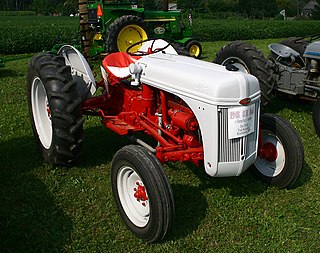
A tractor is an engineering vehicle specifically designed to deliver a high tractive effort at slow speeds, for the purposes of hauling a trailer or machinery such as that used in agriculture, mining or construction. Most commonly, the term is used to describe a farm vehicle that provides the power and traction to mechanize agricultural tasks, especially tillage, and now many more. Agricultural implements may be towed behind or mounted on the tractor, and the tractor may also provide a source of power if the implement is mechanised.
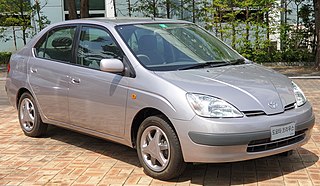
A hybrid vehicle is one that uses two or more distinct types of power, such as submarines that use diesel when surfaced and batteries when submerged. Other means to store energy include pressurized fluid in hydraulic hybrids.

A diesel locomotive is a type of railway locomotive in which the power source is a diesel engine. Several types of diesel locomotives have been developed, differing mainly in the means by which mechanical power is conveyed to the driving wheels. The most common are diesel-electric locomotives and diesel-hydraulic.
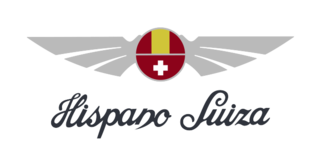
Hispano-Suiza is a Spanish automotive company. It was founded in 1904 by Marc Birkigt and Damián Mateu as an automobile manufacturer and eventually had several factories in Spain and France that produced luxury cars, aircraft engines, trucks and weapons.

L'Aster, Aster, Ateliers de Construction Mecanique l'Aster, was a French manufacturer of automobiles and the leading supplier of engines to other manufacturers from the late 1890s until circa 1910/12. Although primarily known as an engine mass manufacturer the company also produced chassis for coach-works and a complete range of components.
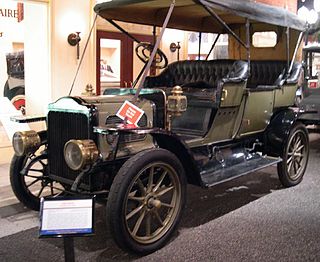
A steam car is a car (automobile) propelled by a steam engine. A steam engine is an external combustion engine (ECE), whereas the gasoline and diesel engines that eventually became standard are internal combustion engines (ICE). ECEs have a lower thermal efficiency, but carbon monoxide production is more readily regulated.

Father Eugenio Barsanti, also named Nicolò, was an Italian engineer, who together with Felice Matteucci of Lucca invented the first version of the internal combustion engine in 1853, Florence. Their patent request was granted in London on June 12, 1854, and published in London's Morning Journal under the title "Specification of Eugene Barsanti and Felix Matteucci, Obtaining Motive Power by the Explosion of Gasses", as documented by the Fondazione Barsanti e Matteucci.
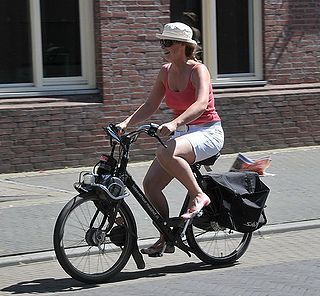
A motorized bicycle is a bicycle with an attached motor or engine and transmission used either to power the vehicle unassisted, or to assist with pedalling. Since it sometimes retains both pedals and a discrete connected drive for rider-powered propulsion, the motorized bicycle is in technical terms a true bicycle, albeit a power-assisted one. Typically they are incapable of speeds above 52 km/h (32 mph); however, in recent years larger motors have been built, allowing bikes to reach speeds of upwards of 113 km/h.

The Alfa Romeo 1750 Berlina and Alfa Romeo 2000 Berlina were executive cars produced by Italian car manufacturer Alfa Romeo from 1968 to 1977. Berlina is the Italian term for a saloon car. Both cars had Alfa Romeo twin cam inline-four engines; the 1.8-litre 1750 Berlina was made between 1968 and 1971, when it was phased out in favour of the improved 2.0-litre 2000 Berlina.

Casteldaccia is a town of 11,628 inhabitants and comune near the Metropolitan City of Palermo, Sicily, southern Italy, founded by Marquis Longarini. It is the seat of the Vini Corvo wine producer, and the Tomasello Pasta factory.

MÁVAG was the largest Hungarian rail vehicle producer. MÁVAG company was the second largest industrial enterprise after the Manfréd Weiss Steel and Metal Works in the Hungarian half of the Austro-Hungarian Monarchy. MÁVAG was the property of the Kingdom of Hungary. After World War II MÁVAG was nationalized, and "Királyi" ("Royal") was removed from its name.
Franco Tosi was an Italian engineer, known for his contributions to steam engine technology.

Lambretta is a brand of motor scooters, manufactured in Milan, Italy, by Innocenti.
The Paris–Marseille–Paris race was the first competitive 'city to city' motor race originating in Paris, where the first car across the line was the winner, prior events having selected the winner by various forms of classification and judging. The race was won by Émile Mayade who completed the ten-day, 1,710 km, event over unsurfaced roads in 67 hours driving a Panhard et Levassor.
The Ciaculli massacre on 30 June 1963 was caused by a car bomb that exploded in Ciaculli, an outlying suburb of Palermo, killing seven police and military officers sent to defuse it after an anonymous phone call. The bomb was intended for Salvatore "Ciaschiteddu" Greco, head of the Sicilian Mafia Commission and the boss of the Ciaculli Mafia family. Mafia boss Pietro Torretta was considered to be the man behind the bomb attack.
The Alfa Romeo Avio was an Italian aviation company producing aircraft engines active since 1941. It was founded as a division of Alfa Romeo but was sold to Aeritalia in 1986 and then to Fiat in 1996. It was merged with Fiat Avio in 2003 as Avio S.p.A.
Oriana Civile is an Italian singer, performer, and songwriter. She is a scholar of Sicilian traditional music and an important exponent of reviving the musical repertory of Sicilian oral tradition. Her innate performing talent and her eclectic, versatile personal voice, especially, allow her to handle many music genres: from the blues to jazz, from bossa nova to flamenco, from Argentine tango to comedy rock, from reviving folk music to exploring world music.
References
- ↑ la Repubblica (28 May 2017). "Oliveri, il sindaco "borghese" che inaugurò il tram" (in Italian).
- 1 2 reportagesicilia.blogspot.com (6 October 2012). "APIS ED AUDAX, LA BREVE ILLUSIONE DELL'AUTO A PALERMO" (in Italian).
- ↑ palermo.mobilita.org (25 October 2018). "Quando a Palermo si costruivano le automobili" (in Italian).
- ↑ Biblioteca Cappuccini Palermo. "PALERMO L'ALTRO IERI / MARIO TACCARI" (in Italian).
- ↑ Giornale di Sicilia. "Addio a Brancato, un maestro di storia moderna" (in Italian).